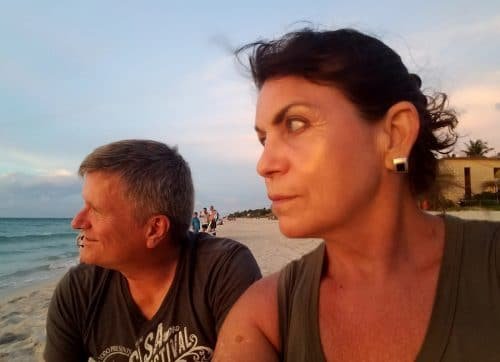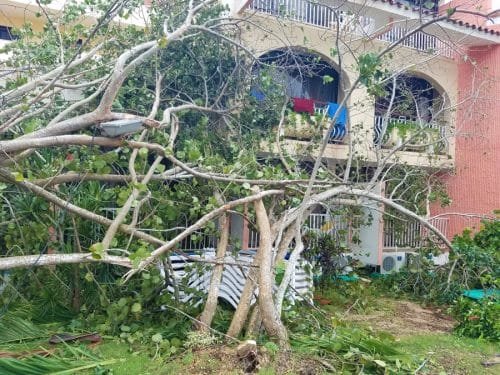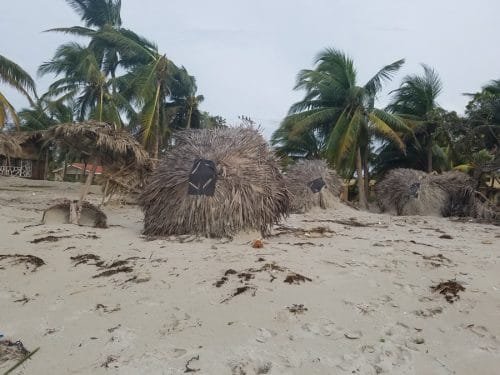 John and Indyrá Miller watch the clouds mounting on the horizon at Varadero Beach as they wait for Hurricane Irma to arrive in Cuba.
John and Indyrá Miller watch the clouds mounting on the horizon at Varadero Beach as they wait for Hurricane Irma to arrive in Cuba.
Vaughn residents Indyrá and John Miller were 11 days into their three-week vacation when Hurricane Irma made a direct hit to the island of Cuba. The storm, which developed on Aug. 30, eventually moved through the Caribbean, several U.S. states and other Atlantic areas, causing catastrophic damage and resulting in more than a hundred deaths.
“We got to experience the hurricane twice, once at Varadero and again in Havana,” John Miller said.
The pair ended up with an unfinished vacation — but luckily, they’ve experienced the country before. They had visited Cuba in 2016 and stayed in an Airbnb rental when they participated in a salsa dance festival.
“Cuba feels so safe. Tourism is their major source of income,” Indyrá said. “Every block is guarded to protect tourists from ‘enterprising’ street vendors. The government allows a few cigar sellers but restricts other sales. Even the dogs are trained to protect the tourists.”
This summer, they booked a hotel at Varadero. As the hurricane intensified in the Atlantic Ocean, the airport in Varadero closed and outbound airline flights were cancelled, so they couldn’t leave.
While they awaited the arrival of the storm, the couple went to Coral Beach to get in some snorkeling.
“Two days before it hit, they wouldn’t take us out. There was too much churning already,” Miller said.
Hotels along the beach evacuated 5,000 tourists from 100 miles away and bused them to Varadero, which has 70 hotels and housed 14,000 tourists from all over the world. The stores sold supplies “mostly for tourists,” Miller said. “The average Cuban can’t afford to buy them,” he said.
Sixteen hours before the hurricane, they had a water aerobics show with formal dancing. “The show must go on,” Indyrá said.
 The Millers’ room was on the second floor behind the fallen trees. They had moved from the first floor of their hotel the day before in anticipation of the coming surge from the beach.
The Millers’ room was on the second floor behind the fallen trees. They had moved from the first floor of their hotel the day before in anticipation of the coming surge from the beach.
“The hotel took such good care of everybody,” she said. “They removed the lounge chairs from the pool, took down the chandeliers from the lobby, boarded and taped up windows and held a meeting with the guests to give instructions. They evacuated the first floor and doubled the occupancy of the guestrooms on the second floor.”
The hotel also provided cold meals and cautioned guests to lock their doors and stay in their rooms. Guests were asked to be in their rooms by 2 p.m. and remain until 8 a.m. the following morning.
“We shared our accommodations with two 30-year-olds from Glasgow, Scotland. With the AC (air conditioning) out, electricity out and no water, it was hot,” Miller said.
Even with the sliding door open 3 feet, the temperatures climbed into the upper ‘90s.
“We talked. We tried to sleep,” Miller said. “The palm trees were bending in the wind, which broke a tree early. There was flooding in lots of ground-floor rooms. They had guards to keep people off the beach.”
“, there were military and a police presence and we knew they were going to take care of this situation,” Indyrá said. “They are a country that is prepared for hurricanes.”
After the storm passed over Varadero, the couple were trying to get back to the airport.
“We were lucky our bellman knew a private cab driver who would drive us back to Havana with five passengers and all their luggage. There were no government taxis running and 100 buses had been cancelled. The streets were too cluttered with debris,” Miller said.
The Cuban government is the largest employer on the island and owns the hotels, restaurants, the beef and lobster industry, and most businesses including a portion of the taxicab service. Miller — a registered nurse who has a bachelor’s degree and teaches nursing students — explained that because the average salary of professionals like physicians, nurses and educators is $10 to $30 a month, many people become creative in how they make a living. Entrepreneurs can earn more by renting rooms (called casa particulares) or running restaurants (paladares) in their homes, or negotiating prices for tourists to ride in their private cars.
 The beach at Varadero Beach, Cuba, after Hurricane Irma’s wrath. Photos courtesy the Millers.
The beach at Varadero Beach, Cuba, after Hurricane Irma’s wrath. Photos courtesy the Millers.
“You have to be careful what kind of car you hire. Some lack door handles, some exhaust carbon fumes and some might not make it the 85 mile, 1 ½-hour drive back to Havana,” Miller said. “Some private cabs are passed down from generation to generation. They make replacement car parts from scratch. An American car might have a Russian engine. They make it last. Some private cab drivers earn more in a day than others make in an entire month.”
Their airport ride ended up being a ’51 Chevy that barely ran and had primer instead of paint. To dodge the jetsam that the storm created, the driver zigzagged back and forth.
“Driving along the Malecon, we saw huge chunks of concrete from the sea wall that had been blown into the road. The locals were pulling stuff, wet mattresses and debris out of their houses,” Indyrá said.
The couple saw police and military, along with hundreds of citizens, clearing debris and trying to save belongings.
“They were doing manual cleanup with machetes and axes,” Miller said. Among the debris that washed up on the beach was a deceased giant tortoise more than 3 feet wide.
When they arrived at the airport, there were no flights. “Maybe tomorrow,” they were told.
The bed and breakfast the couple had originally booked one block from the beach had flooded so they moved into the Tryp Havana Libre Hotel, the old Hilton that Fidel Castro took over a year after it was built.
“You can’t book a hotel from inside Cuba,” Miller said. “You have to contact someone outside the country and have them book it for you.”
The Havana airport finally reopened at midnight on Wednesday after the storm surge on Saturday. There was no power; then the lights came on, then went off. There was no air conditioning, no security scanning, no X-rays.
“People couldn’t leave before the storm; some had to say a week longer,” Miller said.
The couple caught the first regularly scheduled flight, which was on Sept. 14, several days before their originally scheduled return home.
When asked if they were afraid or anxious about the hurricane, Indyra’ said, “I was kind of excited. We were prepared.”
She said the hotel was structurally sound and they had bottled water and some essentials, as well as headlamps, vacuum-packed tuna, salmon and breakfast bars they brought as gifts.
“I had a fear for other people,” she said. “With John’s medical training, I knew we could help others.”
UNDERWRITTEN BY THE FUND FOR NONPROFIT NEWS (NEWSMATCH) AT THE MIAMI FOUNDATION, THE ANGEL GUILD, ADVERTISERS, DONORS AND PEOPLE WHO SUPPORT INDEPENDENT, NONPROFIT LOCAL NEWS